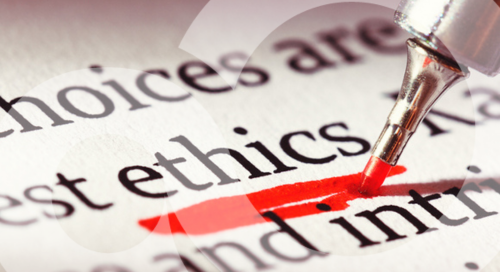Understanding Ethical Fading: An Invisible Corporate Culture Threat
What is ethical fading in business? Ethical fading, a subtle yet pervasive issue, occurs when individuals or groups make unethical decisions while believing they align with their ethical standards.
This phenomenon leads to a dangerous disconnect between actions and moral values, posing a significant threat to organizational integrity.
Ethical fading is not just a theoretical concept but a real-world issue with tangible impact. It’s the process where we become so focused on other factors of a decision, like profit or pressure, that our ethical considerations fade into the background. This fading often happens gradually, making it hard to detect until it’s too late.

An Example of How the Line Between Right and Wrong Can Blur
Consider this ethical fading example: Jane is the Director of Marketing for a mid-size company. While reviewing the proposed budget for the upcoming year, she finds an error that is increasing her budget line by $10k. She goes back and forth in her mind wondering if she should point it out to anyone and ultimately decides to not bring it up. It’s just 10k and her department has been underfunded for years. Plus, it’s not her responsibility to do finance’s job and double-check numbers.
This is a classic case of ethical fading in business, as Jane knows the right thing to do is to point out the error. But instead, she focuses on what she can gain by remaining quiet and rationalizes her decision because it was someone else’s error, and her department deserved the additional funding.
Drivers of Ethical Fading
One of the key drivers of ethical fading is the rationalization of small, seemingly insignificant unethical acts. What starts as minor deviations can quickly escalate, leading to a culture where ethical standards are continuously compromised. This slippery slope is often justified by short-term pressures and the notion that ‘everyone is doing it.’
Addressing ethical fading in businesses requires a multifaceted approach. Leadership plays a crucial role. In a healthy organizational culture, unethical suggestions are immediately recognized and dismissed. Leaders must promote ethical behavior, reward integrity, and ensure that short-term pressures do not lead to ethical compromises.
Preventing Ethical Fading
Fostering a strong, ethical organizational culture is essential to prevent ethical fading. This means creating an environment where ethical behavior is standard, with a focus on transparency, accountability, and open communication.
Team dynamics also play a crucial role; teams rooted in trust, mutual respect, and shared values are more resistant to ethical lapses, as members support and hold each other accountable for ethical decision-making.
Ongoing ethics and compliance training, alongside well-documented codes of conduct and policies, are pivotal for the integrity and success of any organization. Such measures ensure all employees are aware of the legal and ethical standards expected of them, fostering a culture of integrity and accountability. Regular training updates employees on new regulations and ethical dilemmas they might face, enabling them to make informed decisions.
A written code of conduct serves as a clear guideline for acceptable behavior, helping mitigate risks and avoid potential legal issues. Additionally, detailed written policies provide a framework for consistent decision-making and operations, supporting organizational compliance with laws and industry regulations. Collectively, these elements are essential for building trust with stakeholders, maintaining a positive reputation, and ensuring long-term sustainability.
Final Thoughts
The solution is simple. It’s about cultivating a culture where ethical behavior is the norm. And where there is transparent communication and accountable leadership.
By recognizing and addressing the subtle signs of ethical fading, organizations can safeguard their integrity and maintain a trustworthy reputation.
Let’s Start a Conversation
Interested in learning more about how SAI360 can help you cultivate an ethical workplace culture?
Schedule a virtual coffee with a team member.



